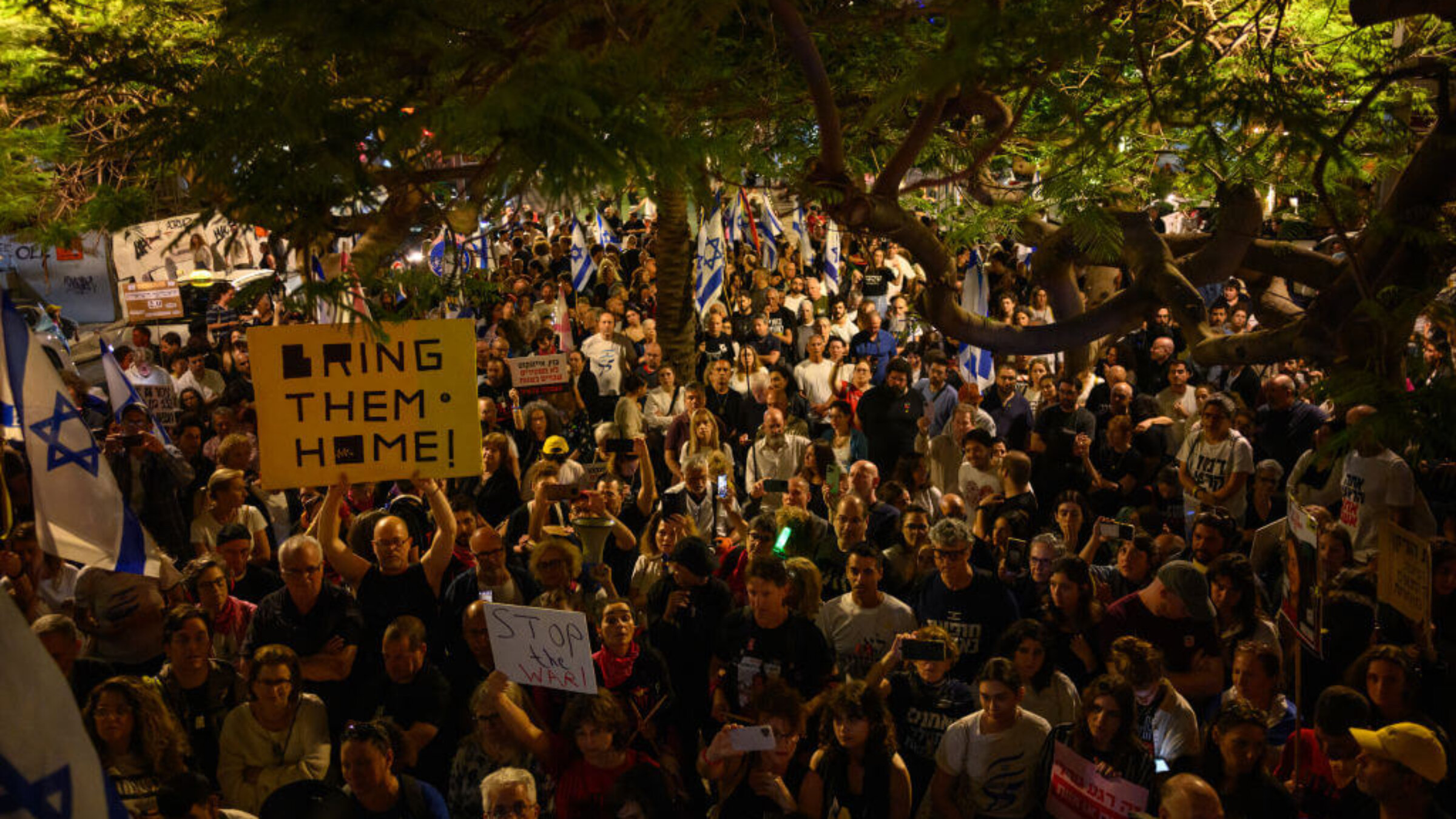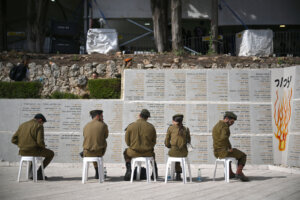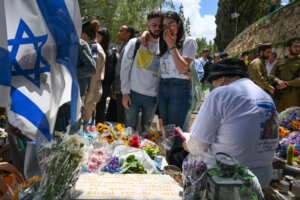Subdued and defiant: An Israeli Independence Day like no other
Traditional celebrations were boycotted and canceled, protesters hit the streets — yet many Israelis still shrugged off their increasing international isolation

Protesters hear the Declaration of Independence being recited in Tel Aviv after a march calling for Prime Minister Benjamin Netanyahu’s resignation. (Photo by Alexi J. Rosenfeld/Getty Images)
TEL AVIV – Thousands of crisp, new Israeli flags were hung during the last week in cities and farming communities, along highways and around soccer stadiums, replacing those that sprung up everywhere after the Oct. 7 attack but have since faded and frayed.
Underneath those flags, though, Israel saw a subdued Independence Day like no other on Monday night and Tuesday as a defiant nation marked its 76th anniversary at a moment of increasing isolation abroad and weariness at home.
The government canceled its annual Independence Day flotilla and most of the traditional Air Force flyovers. Mayors of cities large and small called off performances and fireworks. Survivors from Gaza border communities and celebrities including Idan Amedi — the Fauda actor and reserve soldier who was wounded fighting in the war — declined invitations to bear the national torch.
And protesters took to the streets of this city and others calling on Prime Minister Benjamin Netanyahu and his right-wing cabinet to resign and demanding the release of the 132 hostages still being held captive.
“In my opinion, the celebrations should have been canceled,” said Mali Algazi , who works in real estate and lives in a Jerusalem suburb. “How can we celebrate that our brothers have been captive for seven months? Who knows how they are doing and how much is left of them alive?”

The holiday, called Yom Ha’atzmaut in Hebrew, is typically an upbeat, celebratory one spent barbecuing or at the beach. But in one recent poll, 56% of Israelis said it should be restrained this year, with a brutal war stretching into its eighth month; residents still displaced from communities in the south that Hamas destroyed on Oct. 7 and those in the north that remain under threat from Hezbollah; and growing international criticism from even Israel’s best friend, the United States.
Hostage families held a haunting ceremony Monday night featuring their relatives’ frantic phone calls on Oct. 7, as an alternative to the state-run program. That official ceremony was pre-taped rather than held live on Mount Herzl to avoid potential disruption. Netanyahu nevertheless was indeed heckled at a Memorial Day ceremony earlier on Monday, with critics shouting “garbage” and “you took my children.”
In his remarks, the prime minister repeated his vow to continue the war “until we bring about the collapse of the Hamas terror regime,” promising “revenge” from the perpetrators of the Oct. 7 attack “till the very last one of them.”
“On that dark day, the murderers and their supporters danced on the blood. Yet today, they are no longer dancing,” he said. “We will sever their arms so that they can no longer raise them against Israel.”
But a new poll from the Jewish People Policy Institute shows a marked decline in the portion of Jewish Israelis who are confident about a victory in Gaza: 38%, compared to 74% in October.
Count Moshe Davidovich among them. He heads a group of cities and towns in Israel’s north, where the Israel Defense Forces have been trading missile strikes with the Lebanese Shiite militia Hezbollah across the border for months. At least 60,000 of their residents remain evacuated from their homes.
For Independence Day, some of them plan to blocked off roads in a mock secession from Israel, protesting what Davidovich said is $940 million in promised subsidies the government has failed to deliver.
“The government and the prime minister have been selling us stories for seven months,” he said. “We are simply being bombarded with false promises.”
Similar sentiment led Amedi, the Fauda actor, as well as surviving members of the security team at Kibbutz Be’eri — where dozens were murdered and kidnapped on Oct. 7 — to refuse to take part in the annual torch ceremony, long considered one of the nation’s top honors. Be’eri residents who blame the government for not responding earlier the day of the attack slammed the government’s ceremony as “not respectful or proper.”
But for all the frustration with Netanyahu, many Israeli Jews I interviewed over the past week are far more angry at his international critics, including U.S. President Joe Biden, for pausing weapons deliveries in hopes of pressuring Israel’s leader to ease up in Gaza.
“It’s Israel, not the rest of the world, that knows what’s best for Israel,” said Moshe Minin, a retired business consultant from the coastal city of Netanya.
“Israels have always been too concerned about the way they’re perceived by other states, America especially,” said Tamir Dortal, a right-wing pundit from Jerusalem. “I would prefer to be alive and hated than dead and loved.”
Most seemed unfazed that Egypt is citing Israel’s incursion into Rafah, Gaza’s southernmost city, as cause to join the International Court of Justice case accusing Israel of committing genocide. They were undaunted by several South American countries cutting diplomatic ties with Israel; European threats to block certain Israeli imports; the growing number of countries recognizing Palestinian statehood; and even Biden’s statement of regret that innocent Gaza residents have been killed by bombs supplied by the U.S..
“Your Biden doesn’t know what he’s saying about our situation, about any situation,” said Minin, the business consultant, who — like Israel itself — was born in 1948. “He misses words and has dementia. We have jokes about him.”
Several Israelis I interviewed told me they think the number of civilian casualties in Gaza reported by the Hamas-run health ministry, and generally accepted by Washington and the world, is greatly exaggerated — and dismissed those casualties as inevitable in wartime.
“We are in a war that we have not started,” noted Algazi, the real estate broker. “We will act to defend our country even without assistance.”
Dortal, the conservative pundit, pointed out that Israel continues to have strong support by evangelical Christians in the United States as well as conservative factions in Brazil, India and Eastern Europe. He said his country “should embrace only people that help its interests, whether this faction is nice or despicable.”

That posture “might look from the outside as arrogant” or reckless, he acknowledged.
“But the United States doesn’t understand, and what everybody needs to know is how terribly afraid we are deep inside for our existence,” Dortal said. “We will do what we need to survive.”
That mindset is exactly what Daniel Hacklai, a lawyer from Rehovot, is lamenting this Independence Day. He usually spends the evening of the holiday watching the state ceremony on television, but this year said he feels “too much pain, grief and anger” to do so.
Instead, Hacklai joined a group of hostage families and marched from downtown Tel Aviv toward the home of David Ben-Gurion, Israel’s founding leader. There, he read aloud to the crowd of 3,000 people Israel’s Declaration of Independence, a document he described as full of hope and compassion.
“Sometimes we all need that reminder,” Hackal said.
















